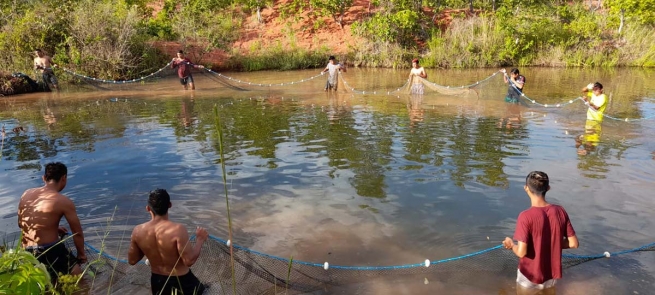The fish project's objective is to provide options for increasing the income and quality of life of women who are part of the "AREME" association and their families, an association made up of just over 60 indigenous women from Boe Bororo ethnic group who joined together to jointly manage development projects of the local community.
Fish farming was developed in the ponds already naturally present in the territory of the community, which had not produced fish for a long time. There are a total of six basins, for a total area of about 20,000 m², where four different fish species have been bred. After the first "pescada" the community has found a good result and the expectation is to achieve a good return for the association.
The project was fully supported by the Salesian Mission of Mato Grosso, Province of Brazil-Campo Grande (BCG), which purchased 33,000 fry to start the business. With foresight and entrepreneurial spirit, the project managers “ripened” 27,000 fish for this first season, leaving around 5,000 for the following season. In addition to the fish, the BCG Province also procured the feed and paid for the technical assistance of professionals in the sector, the transport for sale and the hiring of a full-time employee to help in the management of the fish, with a total investment of almost 50,000 reais (over 7,500 euros) in this project to support indigenous women.
Technical support was provided by the Dom Bosco Catholic University (UCDB) of Campo Grande, through Professor Milena Wolff Ferreira, professor of Zootechnics.
This fish project was a promise of the former BCG Provincial, today General Councilor for Social Communication, Fr Gildásio Mendes dos Santos, to support the women of this community and their families.
According to the Director of the Salesian presence in Meruri, Fr Andelson, fish is culture for the Boe Bororo people. “The fish farming project is used for ritual ceremonies, for food and to obtain resources that will be used for the continuity of the project. This project has also had a beneficial effect on the health problems of the population, given that today many women, in particular, are afflicted with diabetes, a problem aggravated by poor nutrition,” says the Salesian.
Along with fish farming, the Bororo women develop other activities to teach the younger generations the value of work and the importance of family farming. This year in particular, thanks to the AREME association, corn, beans, cassava, bananas, pumpkins and watermelons have already been planted.
 Title
Title
Title
Title
 Title
Title
Title
Title
 Title
Title
Title
Title
 Title
Title
Title
Title
 Title
Title
Title
Title
 Title
Title
Title
Title
 Title
Title
Title
Title
 Title
Title
Title
Title
 Title
Title
Title
Title
 Title
Title
Title
Title
 Title
Title
Title
Title
 Title
Title
Title
Title
 Title
Title
Title
Title
 Title
Title
Title
Title
 Title
Title
Title
Title
https://www.infoans.org/en/component/k2/item/12474#sigProId36eb9fc6ed


